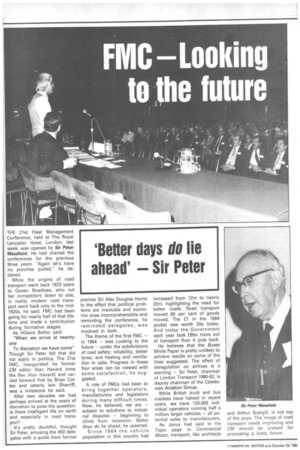'Better days do lie ahead' Sir Peter
Page 30

If you've noticed an error in this article please click here to report it so we can fix it.
THE 21st Fleet Management Conference, held at The Royal Lancaster Hotel, London, last week, was opened by Sir Peter Masefield. He had chaired the conferences for the previous three years. "Again let's have no punches pulled," he declared.
While the origins of road transport went back 1923 years to Queen Boadicea, who cut her competitors down to size, in reality modern road transport went back only to the mid1920s, he said. FMC had been going for nearly half of that lifetime and made a contribution during formative stages.
As Hillaire Belloc said: "When we arrive at twentyone To discretion we have come" Though Sir Peter felt that did not apply in politics, The 21st FMC, inaugurated by former CM editor Alan Havard (now the Rev Alan Havard) and carried forward first by Brian Cottee and latterly lain Sherriff, was a milestone he said.
After two decades we had perhaps arrived at the years of discretion to pose the question: is there intelligent life on earth and especially in road transport?
it's pretty doubtful, thought Sir Peter, amusing the 450 delegates with a quote from former premier Sir Alec Douglas Home to the effect that political problems are insoluble and economic ones incomprehensible and reminding the conference, he reminded delegates, was involved in both.
The theme of the first FMC — in 1964 — was Looking to the future — under the subdivisions of road safety; reliability; better tyres; and heating and ventilation in cabs. Progress in these four areas can be viewed with some satisfaction, he suggested.
A role of FMCs had been to bring together operators, manufacturers and legislators during many difficult times. Now, he believed, we are — subject to solutions to industrial disputes — beginning to climb from recession. Better days do lie ahead, he asserted.
Since 1964 the vehicle population in this country had increased from 12m to nearly 20m, highlighting the need for better roads. Road transport moved 80 per cent of goods moved. The £1 in the 1964 pocket was worth 20p today. And today the Government each year took £6bn more out of transport than it puts back.
He believes that the Buses White Paper is pretty unlikely to achieve results on some of the lines suggested. The effect of deregulation on airlines is a warning — Sir Peter, chairman of London Transport 1980-82, is deputy chairman of the Caledonian Aviation Group.
While British truck and bus markets have halved in recent years, we have 125,000 individual operators running half a million larger vehicles — all potential sales to manufacturers.
As Janus had said in his Topic page in Commercial Motor, transport, like architects and Arthur Scargill, is not top of the pops. The image of road transport needs improving and CM should be praised for promoting a lively forum.
































































































































































































































